Urban Springtime and the element of Air
This is the third in a series of articles on exploring earth-centred spirituality in an urban context. I have been reflecting on the seasons and their frequently associated elements: autumn and water, winter and earth, now spring and air. The four traditional elements are associated in this way, through ascribing them to the four quarters of a circle, divided like a compass by the north, south, east and west lines.
The four directions are considered sacred by many following an earth-spirituality path, and are connected to the solar cycle: the sun rises in the east, so this is the direction of dawn, of new beginnings and thus also springtime. It is a direction sacred to Christianity: churches have long been built with their altars in the east, the congregation standing to face the rising sun, a metaphor for the resurrection. Air and sky are often attributed to the direction of east. South is where the sun reaches full strength at midday, and is thus also connected with summer, with fire and the energy for action. West is the direction of sunset, and thus also with autumn, and tends to be associated with water and feelings. This leaves the north, the region of the sky where the sun does not go. The north tends to be associated with absence of sun, cold, night-time and winter, and the element of earth.
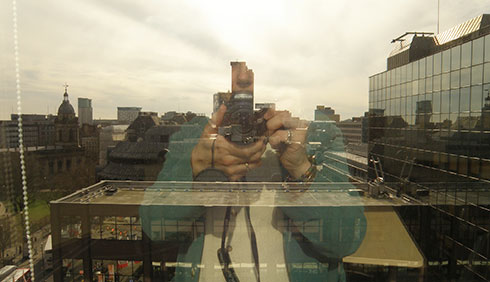
Springtime, of course, is a time of hope and new life, and air, according to tradition, is equated with cerebral matters: thought, the intellect, reason, belief, the possibility of insight, clarity of vision and revelation from beyond, represented by the free flight of birds, the rumblings of storm clouds and the life-affirming promise of spring showers and sunshine.
While I have always tended to find my deeper spiritual experiences are connected with the natural world, I have also spent a significant part of my life in cities and large towns, and it has been a persistent challenge to maintain an essential and realistic connection with nature. While I always appreciate the opportunity to get out into the countryside, and have many well-loved locations to retreat to, daily practise involves looking out for the way Mother Earth makes her presence known in the streets and squares of the city, often in small and subtle ways, but remarkable nonetheless.
This April, I made an intentional walk about the city centre to reflect on the theme for this article, taking photographs as I went. I had an idea that I would focus on birds, but my skills in bird photography are minimal – I captured a couple of pigeons and some seagulls - but found myself drawn not to the birds, as much as the sense of light and the effects of reflection, the openness of the sky.
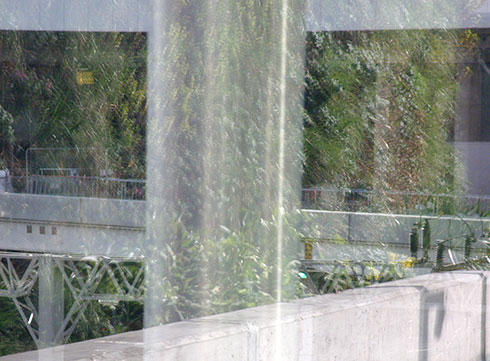
Looking for ‘nature’ in the city, I often find myself looking upwards. Despite our capacity for control, the wild expanse above us, perceived as a dome, to the writers of the Bible, remains enchantingly uncluttered. Above us, ever-changing clouds roll and sweep over, re-forming, dispersing, constantly-moving, ever-sensitive to wind and sun. In itself, the wonder of the sky presents a constant source of fascination and of course an opportunity for us to rehearse our weather-lore, as we try to discern the direction of the wind, and anticipate what might happen next. Forecasting the weather has always been important – how else can a farmer, a fisher or a traveller make wise decisions? Jesus, according to Matthew’s Gospel, referred to the ability to predict the weather:
He answered them, ‘When it is evening, you say, “It will be fair weather, for the sky is red.” And in the morning, “It will be stormy today, for the sky is red and threatening.” You know how to interpret the appearance of the sky, but you cannot interpret the signs of the times.
Matthew 16:2-3 NRSV
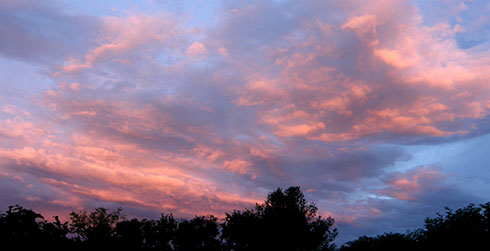
At a personal level, how else do we decide what to wear, and, given a choice, how to spend our time? The weather governs a great many of our decisions and impacts on many of our activities, if only the matter of whether we will be waiting for the bus in rain or sunshine, or whether it is worth risking an umbrella in the gusts of wind. All too often, the weather causes inconvenience because it is not doing what we expected it would do, or because we are not doing what we would prefer to do. The skies, even though we may hardly spare them a glance, affect our mood, collectively and individually.
I took a local train into the centre for my walk. The central station is being redeveloped and one new feature includes a wall of scented springtime plants which is reflected in the shiny new glass screens protecting pedestrians from falling. The effect creates the impression of a ghostly presence of greenery hovering over the snaking metal and oily gravel below.
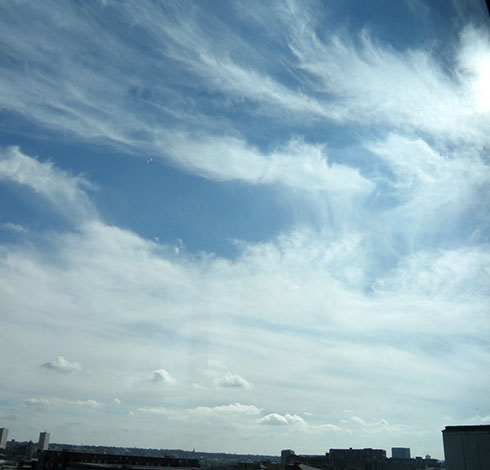
I head for a cafe on the 4th floor of a department store, with a particularly good view south over the city. A friend of mine introduced me to this place; we meet sometimes and talk for hours, about faith and belief, philosophy and the quest for wisdom, our thoughts drawn out, perhaps, by the wonderful views of open sky beyond us. The sky today is clear; wispy white clouds express the energy of the wind that is driving them on. I feel very alive, not quite the aliveness of a mountain-top moment, but certainly something of the awe of being able to look out over such a panorama, the sprawl of the city, the little people down below, the crawling traffic, swooping pigeons and the endless blue above. I think of Jesus, who stood looking down on Jerusalem, lamenting over the people of the city with great tenderness, likening himself to a mother hen sheltering her brood of chicks under her wings. His love for the people of the city reverberates through time and place (Luke 13:31-35 and elsewhere).
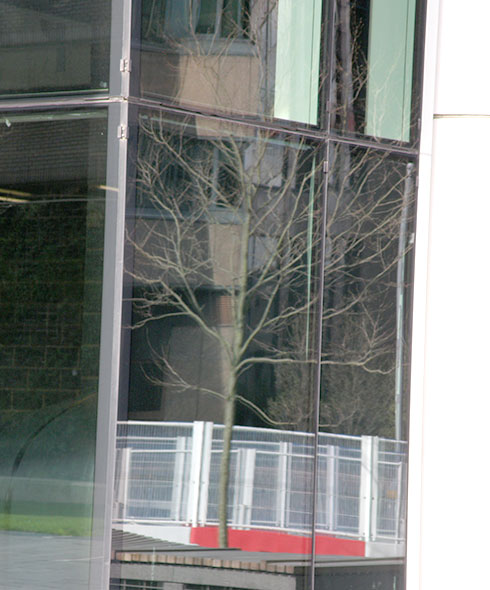
Setting off to walk the streets, I continue to look upwards. I see dandelions and buddleia which have taken root on rooves and in gutters, sprouting from seeds carried by the wind. Trees are breaking into bud, colonised already by tiny winged insects. A cloud of bubbles drift by, blown by a pair of laughing schoolgirls. The fragility of these rainbow orbs speak to me of the earth itself, the finitude of life, our own lives: we are but a breath:
Lord, let me know my end,
and what is the measure of my days;
let me know how fleeting my life is.
You have made my days a few handbreadths,
and my lifetime is as nothing in your sight.
Surely everyone stands as a mere breath.
Psalm 39:4-5 NRSV
Cities and nations rise and fall. The sky goes on and on, while our civilisations develop and decay. Yet the sky too is fragile. Here in the centre of this human-made desert, I can almost count the number of trees on the fingers of my two hands, yet the existence of all animal life is entirely dependent on their presence since primeval times, transforming the ancient atmosphere to make just the right balance of oxygen for us to be able to breathe. The very air we breathe is a precious resource, a wonder of creation. But we, unconsciously at first, and now consciously, cut down the trees and pump carbon dioxide into the air as though attacking our own lungs. What are we doing? We are changing the skies, we are playing with the vast forces of wind, air, heat and rain, the domain, traditionally, of the gods – or God.

I love bubbles, but my thoughts have lowered my spirits. I look up and around me for hope. ‘Where is God in this? Where is hope? Have we already gone too far?’ Ahead of me is a tall building, made entirely of reflective panels defined by a grid of black lines; it is as though the sky itself has been boxed. The sense of human control tightens. We do control the skies – to a degree. Round the corner from this office block, is an area I have not visited before. A rectangle of grass sits like a neat carpet; a solitary tree is mirrored by the window behind it, as though there are two trees, not one: an illusion of abundance. Before me is a pillar with a reflective panel. I photograph myself, almost playfully, the green of my jacket echoing the living wall of ferns behind. My presence in this place is of course human, as human as the other passers-by. But my presence is animal too: although I am far removed from my ancestors, I too am part of the natural world. I feel a little uncomfortable; I realise that I bear the responsibility that we all share, for the way we treat this planet, as much as I share a hunger for a more sustainable approach. I meet my own gaze with reproach. I have asked, ‘where is God in this?’ and ‘Where is hope? Have we gone too far?’ The answer is deep in my own eyes.
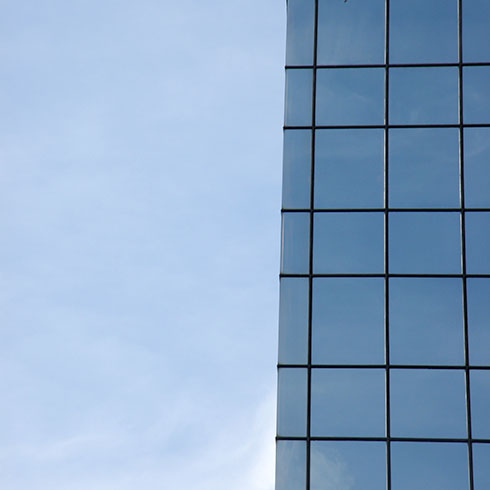
I have a meeting to go to and make my way into one of the tall buildings across the square. Inside, there is a magnificent view out over the rooftops of the city, swooping-ground of gulls. This is a last opportunity for photos and I try to capture the flight of some of these birds, gliding so effortlessly over what, to them, must seem like rocky outcrops and clifftops without a sea. But again, the light is playing games with me, and instead of a clear picture of ‘out there’, I end up with a reflection of myself, superimposed on the window. It seems I cannot escape the reality of my presence here, the difference each person makes, the value of each human, the responsibility, the presence of the divine within, the hope, the fear, the desperate need to see our existence on earth for what it is, as creators and destroyers with mixed motives.
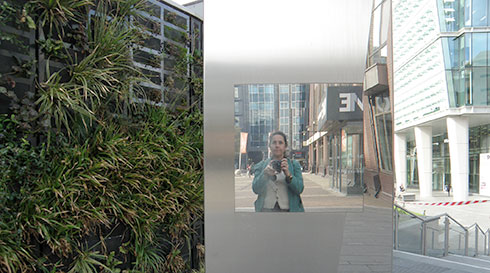
Walking in the countryside is easier in some respects: I am not constantly confronted with my own image like this, I can look out at a world beyond me, treading softly, listening, watching, trying to make myself as unnoticeable as possible to the creatures whose space I have entered; I can pretend that human presence and activity is minimal and retreat into a fantasy that there are untouched areas, where all is well and nature continues as it should. But this is indeed a fantasy; we have touched everything, even the air we breathe. Here in the city the nature of humanity is stark, honest and unavoidable, there is a clarity and a constant challenge to be self-reflective, that will not go away.
For now we see in a mirror, dimly, but then we will see face to face. Now I know only in part; then I will know fully, even as I have been fully known. 13And now faith, hope, and love abide, these three; and the greatest of these is love.
1 Corinthians 13:12-13 NRSV
Suggestions for reflection
- Wherever you are, as well as acknowledging the presence of other living things in the environment, be aware of your own presence. What kind of impact do you yourself have on the environment?
- Take time to look up at the sky, and consider brushing up on your weather-lore and forecasting ability in interpreting the skies and behaviour of creatures – cattle lying down, swallows flying low, red sky at night ...
- Choose one of the biblical quotations above to mull over, or seek out other quotations on themes of air, reflection, light and human presence in the environment.
- Notice your reflection in mirrors, water and windows, and the reflections of the world around you, especially the sky and natural features. What do such reflections say to you?
Please bookmark this post at Facebook or Twitter:


Your comments:
Your thoughts on the sky remind me of a pastoral visit I made to a very frail and holy woman in a nursing home. She had been there for years. I had been told to visit her as it would do me good. I was appalled that whilst the nursing home was set in the most beautiful grounds which burst with wildlife, the windows in her room were set so high that she, confined to her bed, could not see nature in its glory. Her outlook seemed to be confined to institutional furniture and equipment. Insensitively, I referred to this and she smiled and said, “Oh, but I can see the sky. God has so much to say to me through the sky.”
#2. By Karin Shaw on August 14, 2014

Pleasley Forest Church
Encountering the Eternal One within the ancient boundaries of Sherwood Forest More ...

Essex Forest Church
We seek to find the presence of God in the open air and in nature, and to connect with the Divine Being who is present in creation. We seek to foster a love of creation, a love which will lead us to care for it. We look for reconciliation between nature and human beings, and within human relationships. More ...
oxforddiocese:
Great to see how @RiponCuddesdon are engaging with @ARochaUK Eco Church scheme - love the Forest Church area made b… twitter.com/i/web/status/1…
18 Aug 22
YBS_Church:
Our Forest Church takes place on Sunday, 28th August, at 4.30pm in the Gifford Community Woodland (Fawn Wood), for… twitter.com/i/web/status/1…
19 Aug 22
rebeccaBug:
Tremeirchion have their first Forest Church service tomorrow so the boys thought they had better check out that the… twitter.com/i/web/status/1…
20 Aug 22

I loved your reflections- pun intended! I am also continually drawn to the sky when in urban areas, and lacking the hills which I grew up seeing. I wonder if you know this poem by eecummings which sprang to mind when I read your piece:
Spring is like a perhaps hand
(which comes carefully
out of Nowhere)arranging
a window,into which people look(while
people stare
arranging and changing placing
carefully there a strange
thing and a known thing here)and
changing everything carefully
spring is like a perhaps
Hand in a window
(carefully to
and from moving New and
Old things,while
people stare carefully
moving a perhaps
fraction of flower here placing
an inch of air there)and
without breaking anything.
e.e.cummings
#1. By Barbara on July 08, 2014